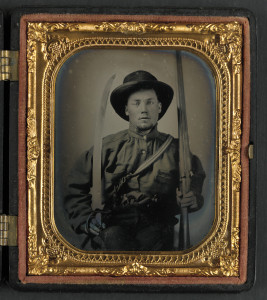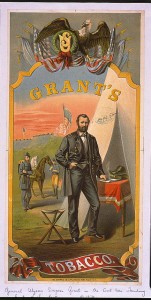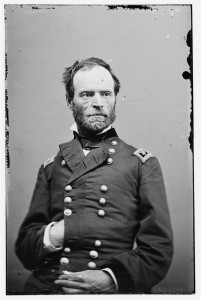This article would have been published earlier than May 30, 1865 because even folks up here in New York state would already have known that Jefferson Davis was captured.
From a Seneca County, New York newspaper in May 1865:
The first man killed in the late war was Daniel How, of New York, at Fort Sumter in 1861, by premature discharge of a gun. His name has been frequently and erroneously reported as Hough.
Some citizens of Troy on Saturday last forwarded to General Grant a present that will “take his fancy.” It is a box of cigars, 100 in numder [sic], of the finest brand, and costing $100. Each cigar has a paper holder, and the box itself is got up “regardless of expense.”
The Washington Intelligencer of Wednesday, says the government has thirty-three millions of gold on hand. It is known that the government is prepared to pay the coin interest due in July.
The Rochester Union mentions it as a note-worthy fact that President Johnson’s appointments of assessors and collectors for Virginia, are in every instance Virginians. The ultra radical plan of Sumner &Co., was to fill all these places with “patriots” from the North.
Large numbers of army and navy officers are daily sending their resignations to their respective departments, which accept them as fast as received.
Gen. Sherman captured more cannon without a battle than Napoleon ever took in any three of his heaviest battles.
The Grand Chapter of Free Masons of the State of Maine have voted the sum of $300 to Dr. Mackey of Charleston for his great service to the Union prisoners during the war.
Jef. Davis’s whereabouts are still a mystery. At key West, on the 1st inst., there was a rumor that he was making for the Florida Coast with a view to escape in a small vessel to Cuba.
Stanton’s odious censorship of the telegraph continues. He uses it to puff himself and his department and detract from his associates.
A Nevada paper says that at night the streets of Virginia City, in that State, resound with screams of women whose husbands are beating them.
The Western widows are calling indignation meetings with reference to the advent of Massachusetts girls. The male persuasion is too scarce for the home market.
Miss Anna E. Dickinson has sent $922,36, the proceeds of one of her lectures at the Philadelphia Academy of Music, to the Mayor of that city, to be added to the fund for the erection of a monument to President Lincoln.
“How long will it take me to go to Richmond?” asked an eager officer at City Point of a veteran brigadier holding command there, soon after we got the good news. “I can’t say how long it will take you, was the answer; it has taken me three years and eleven months.

“Unidentified soldier in Confederate uniform with double barrel shotgun, Bowie knife, and two pistols” (Library of Congress)
No portraits of Booth, or any rebel officer or soldier are to be exposed for sale in the middle military division, by order of Major General Wallace.
A couple of scoundrels in Burlington county, N.J., have been collecting subscription [sic] for a monument to President Lincoln, and pocketing them.
General Grant has ordered Major General Dana, commanding the Department of the Mississippi, to report at his place of residence, and appointed Gen. Warren to that command.
150 years later we now know that Daniel How’s real name was Daniel Hough, apparently.
Cigars probably helped General Grant endure the war; they almost certainly contributed to his terminal throat cancer.
Another short clipping in the Seneca Falls, New York paper said that General Dana was under arrest in Vicksburg for his involvement in the Sultana Disaster, but he reportedly “resigned from the U.S. Army on May 27, 1865, and became a miner.”


